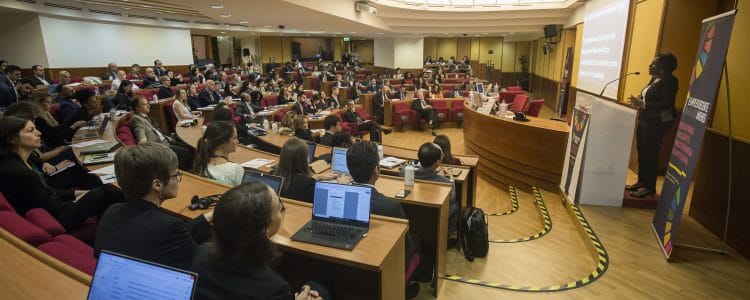
Today we congratulate ILO on its 100th anniversary. This tripartite (governments, employers, and workers) institution, which was established to promote social justice and better working conditions against a backdrop of the industrial exploitation of workers, still represents an immense mission, as captured in the Preamble of its Constitution
“…the failure of any nation to adopt humane conditions of labour is an obstacle in the way of other nations to improve the conditions of their own countries.”
The latest World Bank Report, Accelerating Poverty Reduction in Africa, states that with a business as usual scenario, poverty is expected to decline to 23% in 2030 and will become “primarily an African phenomenon”. Africa is the youngest continent, with 20% of the world’s youth (15–24 years old) in 2015, and by 2030 it is estimated that 30 million youth will be entering the African labour market annually. These youth will all seek employment and there is a real danger that millions of them will be left behind in the years to come.
Let’s use this celebratory day to reflect on this and to look forward to opportunities to fulfil the pledge of social justice and decent work by 2030.
Small and informal matters
One such opportunity is to celebrate the importance of small and informal businesses in Africa. The latest ILO report, Small Matters: Global Evidence on the Contribution to Employment by the Self-Employed, Micro-enterprises and SMEs, which spans 99 countries, shows that in recent years the majority of employment has been generated by self-employment and micro-enterprises. Evidence also shows the importance of informality worldwide, especially in Africa and among its growing youth population.
- Small economic units (up to 9 employees) account for 70% of total employment (84.3% in Sub-Saharan Africa)1
- 80% of Sub-Saharan Africa’s workers are informal
- Around 78% of small economic units operate within the informal sector1
- Some 362 million youth are working in informal employment worldwide, more than half of whom are in Sub-Saharan Africa or southern Asia
Despite its presence and significance for employment, Africa’s SMEs and informal economy still suffer from low income rates, a high level of uncertainty and lack of social protection for workers.
Beyond formalization
Over the years, informality has become synonymous with poverty, tax evasion and the avoidance of regulation, prompting governments and NGOs to push for formalization. However, it is being recognized that informality also offers flexibility, creativity and growth opportunities beyond survival, in the absence of other supportive structures or opportunities. In addition, the informal sector is very much linked to wider economic systems. Seeing informality from this perspective means acknowledging the daily reality of informality:
- The contribution of informal activities to the economy (indirect taxes and linkages with the formal economy) and to fulfilling societal functions (e.g. informal waste pickers and informal cross-border traders)
- Technical and vocational skills development through informal apprenticeship
- The diverse ways informal workers have of organizing and raising their voices, and the ways they deal with decent work deficits (see INCLUDE policy brief Informal workers’ political leverage in Ghana and Benin)
There are steps that can be taken to make policy more inclusive of informal enterprises and workers, and to generate knowledge that embodies the daily realities of informal workers. Small and informal businesses face major constraints in accessing finance and markets, managing risks and occupational hazards, acquiring business skills, and navigating unconducive regulatory and operating environments. On top of that, they generally do not benefit from formalization policies, and may experience adverse impacts from policies aimed at improving the formal sector, such as trade facilitation or minimum wages. Women in informal employment face disparate challenges in their work and entrepreneurship, for example, occupational segregation and inhibiting social norms. These issues need to be addressed to unlock the potential of informal workers and small businesses.
Informality is not rooted in abnormality – it is normal. Given that informality has been researched for over 45 years, and given that the new ILO budget for the next biennium is in the pipeline – and in honour of the 100th anniversary of its cause to leave no one behind – we hope that ILO will lead efforts to reach out to those workers in informal enterprises, to see what works for them. In the coming years INCLUDE will be contributing to knowledge on informal entrepreneurship and employment to achieve better, and more evidence-based, inclusive development policies and practices in Africa. In the run-up to 2030, when ILO will be celebrating its 111th anniversary and the time will be up for the SDGs, we hope that informality will no longer be seen as an obstacle, but as a building block for decent and productive employment for all.
1. International Labour Organization. (2019). Small matters: global evidence on the contribution to employment by the self-employed, micro-enterprises and SMEs. Geneva: ILO.



